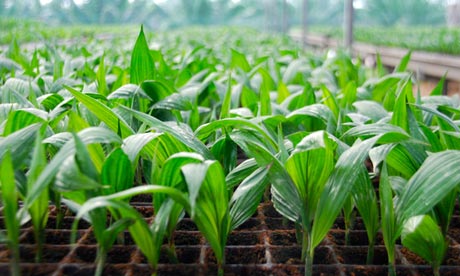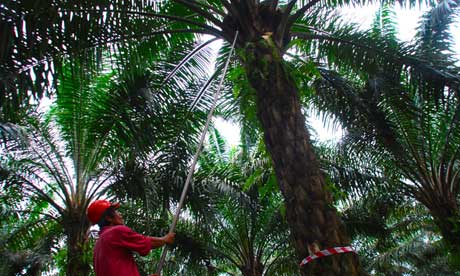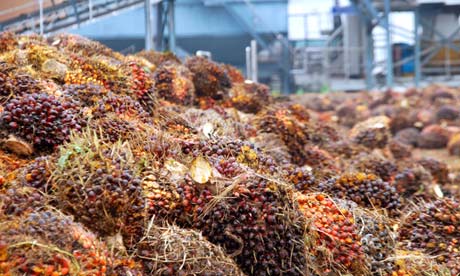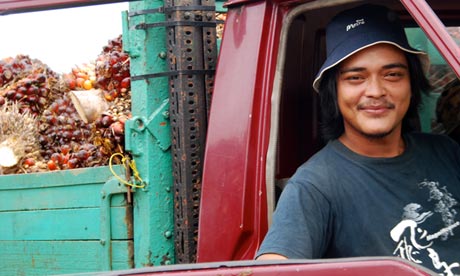
Palm oil boom: palm oil is versatile stuff. An edible vegetable oil, it goes into everything from margarine and soaps to shampoos and fuels.
As the highest-yielding vegetable oil crop, global production is soaring. Total capacity has jumped by 128% over the last decade to 58m tonnes per year.
The vast majority (85%) comes from Malaysia and Indonesia, where the cash crop is held responsible for causing widespread deforestation over the last four decades. Palm oil grows in tropical areas around the equator. Now producers of the cash crop are eyeing up forested areas in the Amazon, Congo and Borneo for new plantations.
 RSPO’s producer members commit to preserve moisture, prevent run-off and reduce fertiliser use, among other good agricultural practices. Photograph: Oliver Balch
RSPO’s producer members commit to preserve moisture, prevent run-off and reduce fertiliser use, among other good agricultural practices. Photograph: Oliver BalchResponsible production: in 2004, a group of environmental non-profits and palm oil companies joined together to set up the Roundtable for Sustainable Palm Oil (RSPO). The roundtable sets out eight principles, citing 39 criteria, which are designed to prevent the worst aspects of palm oil cultivation: illegal deforestation, chemical pollution, destruction of biodiversity, water loss, poor employment conditions etc. With nearly 1,300 members, it is the largest multi-stakeholder initiative of its kind. Certified sustainable palm oil accounts for 15% of global production – too small at present to offset the sector's worst impacts.
 Felda's palm oil mill No. 21, Jengka district, Malaysia: 16 of Felda's 71 mills are certified under RSPO. The company has three years to certify the remainder. Photograph: Oliver Balch
Felda's palm oil mill No. 21, Jengka district, Malaysia: 16 of Felda's 71 mills are certified under RSPO. The company has three years to certify the remainder. Photograph: Oliver BalchCertification: To qualify as sustainably certified, growers must prove to external independent auditors that they are compliant with RSPO's principles and criteria. At present, 44 of the roundtable's 123 grower members are certified, corresponding to 2.4m hectares of land – over 90% of which are in Indonesia and Malaysia. Darrel Webber, general secretary of the roundtable, insists that the scheme is changing the industry's mindset. Initially, palm oil companies bought land and thought only about how many bulldozers they needed to clear it, he says. "Now, ask any CEO, they actually say, 'Where can I find high conservation value experts … before I send my bulldozers?"
 Felda Agricultural Services, based in Malaysia’s Jengka district, provides recreational facilities for its 137 workers and their families. Photograph: Oliver Balch
Felda Agricultural Services, based in Malaysia’s Jengka district, provides recreational facilities for its 137 workers and their families. Photograph: Oliver BalchEconomic benefits: Palm oil production is tainted by poor working conditions, lack of health and safety and low wages in many parts of the world. To qualify for roundtable certification, growers must show they issue protective equipment to workers, provide adequate accommodation, pay the minimum wage (around 900 ringgit, or £184, per month in Malaysia) and offer healthcare and other benefits. In Malaysia and Indonesia, the palm oil sector accounts for 590,000 and 3.7 million direct workers respectively.
"Booming commodity prices in recent years have trickled up through this labour-intensive system, helping to lift millions out of poverty," a recent report by WWF on the palm oil industry found. The roundtable is working with the Royal Society on a five-year programme to assess the social impacts of its certification process.
 Due to low demand, sustainably certified palm oil is generally mixed with non-certified palm oil during the export phase. Photograph: Oliver Balch
Due to low demand, sustainably certified palm oil is generally mixed with non-certified palm oil during the export phase. Photograph: Oliver BalchLabelling: RSPO-certified palm oil is freely available on the market, but for consumer brands to use the RSPO label they must be members of the certification body. Where physical supply is unavailable, buyers can purchase Green Palm certificates, which act as virtual credits for offsetting purposes.
Indonesia is now developing its own sustainable palm oil label. Malaysia is set to follow shortly.
The majority of certified palm oil is mixed with conventional vegetable oil during transportation. As a result, consumer products may appear with the RSPO logo, but will most likely contain unsustainable palm oil.
"The consumer has to understand that there is a natural progression here", says RSPO's Darrel Webber. "The end goal is segregation [ie, sustainable palm oil that is separated during transportation], but there's just not the volume yet."
http://www.guardian.co.uk/sustainable-business/palm-oil-production-social-environmental-impacts
'庫間 > 해외자료' 카테고리의 다른 글
| 기후변화에 맞서 스리랑카의 농민들이 고대의 관개 체계를 활용하자고 요구 (0) | 2013.07.08 |
|---|---|
| 인류의 미래를 위협하는 수자원 문제 (0) | 2013.07.08 |
| 현대 기술에 시대를 초월한 농법을 접붙이다 (0) | 2013.07.07 |
| 커피로 만드는 퇴비의 이점 (0) | 2013.06.29 |
| GM 작물에 대한 논란과 그 실례 (0) | 2013.06.29 |


